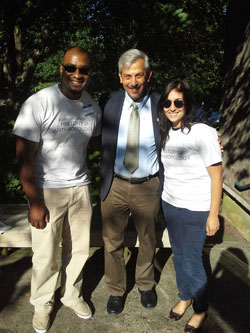“Living on One Dollar,” a film documentary that followed the lives of four men who spent two months in rural Guatemala living on a dollar a day, was presented in Wilson Auditorium on Tuesday, Sept. 17. The Student Activities Board (SAB) and the Office of Transition and Leadership Programs co-sponsored the event.
The stars and co-founders of the documentary, Zach Ingrasci and Chris Temple, the executive directors, along with Sean Leonard and Ryan Christoffersen, the creative directors, spent 56 days together in Pena Blanca, Guatemala to raise awareness of poverty. In the 54 minute film, Leonard and Christoffersen recorded their experiences behind the scenes, while Ingrasci and Temple shared their experiences about their journey on camera. Ingrasci and Temple were the presenters at the event on Tuesday.
“Whole Planet Foundation helped fund the original trip [to Guatemala] with $3,000,” Temple said. “I had worked with them a few years ago as an intern while on a gap year before high school and college. We still raise money for them and have so far raised $32,690,” Temple added.
Over 1 billion people around the world live on one dollar a day and seven out of 10 people in Pena Blanca, a village of around 300 people, live under the poverty line, according to the “Living on One Dollar” film. However, Temple said, “It’s not about statistics; it’s about the real people and their hopes and dreams.”
The group created a system that would make their trip the most realistic and beneficial to their goal of experiencing the lives of the poor. They each came with $56, but since it is unpredictable as to when an individual who is poor will receive money, the men wrote different denominations on separate pieces of paper, totaling a combined $224.
During their time in Pena Blanca, they placed the sheets of paper in a hat and randomly selected one piece every day to decide their financial fate for the next 24 hours. If they choose a zero, they would not have money to buy food, toilet paper or basic necessities unless they had previously saved money.
They quickly realized how difficult this experience was. “We were living on the edge, one step away from falling into a really bad situation,” Temple said.
During the day, the men worked on growing radishes to eat. They rationed their money mainly to buy rice, beans and bananas at the market, and drank murky, unpurified water. At night, the group slept on the ground in the company of fleas.
They also had the opportunity to create relationships with the people of Pena Blanca.
The documentary gave students a whole new perspective on a different culture.
Jesse Arrieta, senior health studies major, said, “As a college student, we are geared to only worry about what’s happening in our immediate lives.” He added, “This film takes college students and immerses them into the lives of the greater population of Guatemala that is the poor.”
The men met a woman named Rosa who affected them so significantly that they began raising money for her education through micro financing, a banking service provided to individuals with low or no income, since she could not afford to go to school.
Victoria Day, junior communication major, compared students in the United States with prospective students in Guatemala. “I learned that they wait almost their whole life just to get a simple loan when we as college students basically live off loans.” She added that the film did a great job of creating empathy for the Guatemalan people. “It’s truly amazing. You almost felt connected to the people in the documentary.”
The stars of the documentary also met Chino, a 12-year-old boy whom Ingrasci and the other men taught Spanish to. Chico was not able to go to school because he was required to work early in his life to help support his family, according to the film.
They also met Anthony, a 24-year-old man who lived with his wife, 20, and children. The entire family lived on $1.25 a day and, even so, had the four men over for dinner and shared what they had. Anthony was generous with the men and told them “for me, you are my brothers.”
Danielle St. John, sophomore math major, attended the documentary because she is interested in going on the University’s alternative Spring Break trip to Guatemala. “I like the documentary a lot because it shows how impoverished Guatemala really is and shows how hard it actually is to live that way,” St. John said.



